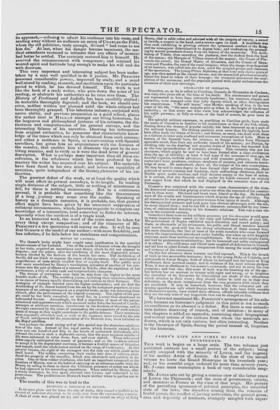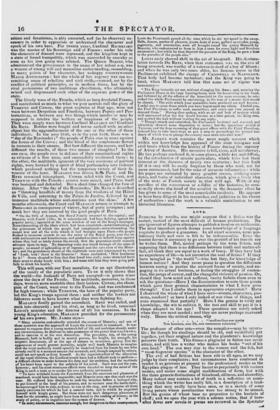JAMES'S LIFE AND TIMES OF LOUIS THE FOURTEENTH.
THIS work is begun on a large scale. The two volumes just published embrace but a small portion of the subject ; being mostly occupied with the miuority of Louis, and the regency of his mother ANNE of Austria. At the close of the second volume we leave the Grand Monarque in his twentieth year; and, as his eventful reign endured for more than seventy years, Mr. JAMES must contemplate a book of very considerable mags nitude.
Mr. JAMES sets out by giving a concise view of the latter years of Louis the Thirteenth ; and the state of government, society, and manners in France at the close of that reign. His picture of the prevailing ignorance of political principles, the unsettled state of the laws, the disorders arising from the remains of feudal power, the conflict of jarring authorities, the general gross; uess and depravity of manners, strangely mingled with super. stition and fanaticism, is ably executed, and (as lie observes) ne- cessary in order to appreciate or understand the character and epoch of his own hero. For twenty years, Cardinal RICHELIEU was the master of his Sovereign and of France: under his rule the elements of discord were repressed, and the kingdom kept in a state of forced tranquillity, which was succeeded by anarchy as soon as his iron grasp was relaxed. The Queen Regent, who administered the government in the name of her infant son, was a woman of strong will and masculine understanding, resembling, in many points of her character, her unhappy countrywoman MARIE ANTOINETTE : but the whole of her regency was one un- remitting scene of rebellion and civil strife,—caused, not by the conflict of political principles, as in modern times, but by the rival pretensions of two ambitious churchmen, who ultimately seized and dispossessed each other of the supreme power of the state.
The bloody wars of the Fronde, which so long desolated Franco, and contributed so much to what we poor mortals call the glory of TURENNE and CONDE, the great captains of that age, were not wars between Despotism and Freedom, between Popery and Pro- testantism, or between any two things which involve or may be supposed to involve the welfare or happiness of the people. They were simply wars between Cardinal MAZARIN and Cardinal Da RETZ. Battles were fought and towns sacked with no other object but the aggrandizement of the one or the other of these individuals. In the year 1648, as in the year 1830, there was a 4‘ day of the Barricades ;" the people of Paris rose in arias against the forces of the Crown ; and the blood of the combatants flowed in torrents in their streets. But how different the causes, and how different the results, of these two scenes of slaughter! In the one case, the people rose in defence of their constitutional rights as citizens of a free state, and successfully viialicated them : in the other, the multitude, ignorant of the very existence of political rights, were hurried by a spirit of blind partisanship into violence which produced nothing but the temporary victory of their fa- vourite of the hour. MAZARIN was driven frets Paris, and DE RETZ remained triumphant. CONDE sided with the Court, and TURENNE with the Fronde : armies were raised, and Paris itself was besieged and defended. But a short time changed the face of things. After "the day of the Barricades,- Ds: RETZ is described as "throwing handfuls of money from the windows of the Witel de Ville, and returning to the Palais de Justice, followed by an immense multitude whose acclamations rent the skies." A few months afterwards, the Court and MAZARIN return in triumph to Paris—not in consequence of victory, but of party intrigues ; and mark bow they are received by the good people of Paris.
" On the 18th of August, the Royal Family returned to the capital ; and Mazarin, with Conde [who, be it remembered, had been fighting against the popular party,] appeared at the same window of one of the King's carriages. Notwithstanding all the libels which had been circulated—notwithstandiug all the grievances of which the people had complained—notwithstanding the recent war and all the evils which it had brought upon Paris—the people flocked in immense crowds to see the entry of the Royal party, rent the air with acclamations and benedictions, and pressed so close to behold those against whom they had so lately drawn the sword, that the procession could scarcely advance upon its way. No dissenting voice was heard through all the mass of people; no sound of upbraiding or of reproach met the cars even of the Minis-
ter; and the gratulatory shouts of the multitude were only interrupted by cries of Look, look! there is the Mazario l' Some exclaimed, How handsome be is !' Some shouted to him that they loved him well; some stretched forth their arms to shake hands with Dim; and some told him they were going pub- licly to drink his health."
This will pass, with our Tory moralists, for an apt illustration of the vanity of the popularis aura. To us it only shows that the world—the badauds of Paris not excepted—is grown wiser since the days of the Fronde. The multitude, moreover, in those days, were no more unstable than their betters. CONDE, the cham- pion of the Court, went over to the Fronde, and was condemned for high treason; while TURENNE, the hero of the popular patty, led the King's troops against them : and neither the leaders nor followers seem to have known what they were fighting for. MAZARIN finally gained the ascendant. RETZ was exiled, and sank into obscurity ; and his rival, as long as he lived, remained Louts's minister and the director of all his measures. In the young King's education, MAZARIN provided fur the permanency of his own power. Mr. JAMES says- " Many anxieties undoubtedly attended the course of Mazarin ; and one of those anxieties was the approach of Louis the Yourteenth to manhood. It was natural to suppose that a young morlarch full of life and ambition should, under any circumstances, be desirous to take possession of the power that was his own, and to exercise it at his own discretion. The precocity, too, of the young Monarch, both in bodily and in mental powers, his height, his strength, his majestic demeanour, all at the age of sixteen or seventeen, giving him the appearance of much greater maturity, might well teach Mazarin to imagine that the royal authority would speedily be snatched from his hands by one who already could in a moment assume the monarch, and, though inspired by others, could act and speak as from himself. As the superintendent of the education of the royal children, the Cardinal would have had a difficult task to perform- s difficult choice to make between his duty and his ambition, had the rectitude of his beast been equal to the subtlety of his mind. Such was not the case, however ; and his most strenuous efforts were directed to keep the mind of the King in such a state as to render his own authority permanent. " To have withheld Louis the Fourteenth from the exercises and pleasures of manhood, would have been impossible; and Mazarin soon saw that such was the case. He suffered him therefore to seek the trenches before a besieged city, to put himself at the head of hiaarmies, and to venture near the battle-field ; he encouraged him to ride, to fence, to run at the ring, and to practise all those manly exercises for which be had a natural taste, and in which he acquitted himself with kingly grace. But these were not such dangerous pleasures, at least for the minister, as might have been found in the reading of history, in the study of policy, or in inquiries into the system of finance. ' • • la many amusements, innocent enough, but dangerous in their consequences,
Louis the Fourteenth passed all the time which he did not spend in the camp. Balls, dances, parties of pleasure, jousts, feats of arms, gallant spectacles, pomp, pageantry, and ostentation, were all brought round the young Monarch by Mazarin, who endeavoured to form in him a taste for every light and frivolous amusement ; but while he thus directed the pursuits of the king, he gave a bent to the pursuits of the people also."
Louis early showed skill in the art of kingcraft. His dissimu- lation towards DE RETZ, when that statesman was on the eve of being arrested, was worthy of a veteran instead of a boy of fifteen; and when he was only two years older, his famous scene in the Parliament exhibited the energy of CROMWELL Or NAPOLEON. That body had become turbulent; and the King was going to hunt, when MAZARIN told him that some act of vigour was necessary— a The King instantly set out, without changing his dress; and, entering the Parliament House in his large hunting-boots, with his hurse.whip in his hand, and followed by all the officers of the household in the same costume, he asto- nished the whole Parliament by exclaiming, iu the tone of a master that would be obeyed, ' The evils which your assemblies have produced are well known: I order you to cease those which you have begun upon my edicts. I forbid you, the First President, to suffer such assemblies; and every one here present to demand them.' Having thus spoken, with an air and look of majesty which well announced what the boy would become at a later period, the King rose, and quitted the hall without waiting for any reply. "'Though struck and astonished, the Parliament hesitated and wavered, and ultimately showed some disposition to resist ; but the opportune arrival of Tommie, and the firm reasoning of that great officer with the Chief President, induced him to take 'such steps as put a stop to proceedings the natural ten- dency of which was to plunge the country once more into civil war."
Mr. JAMES'S work contains the most ample account which within our knowledge has appeared of the state intrigues and civil broils which form the history of France during the regency of ANNE of Austria. His narrative is full, clear, and satisfactory. He has perhaps rendered it, in some places, a little slry and diffuse, by the introduction of minute particulars, which have lost their interest at the distance of nearly two centuries : but this fault (if it is one) will be easily forgiven by those who read, not for mere amusement, but for the sake of accurate information while his pages are animated by many graphic scenes, striking,' anec- dotes, and traits of individual character, which give a lively idea of the state of French society in that wild age. With lut any sacrifice of the correctness or solidity of the historian, he occa- sionally shows the band of the novelist in the dramatic effect he has given to some of the most remarkable incidents. He appears to have been diligent in his researches, and judicious in his choice of authorities : and the work is a valuable contribution to our historical literature.
































 Previous page
Previous page